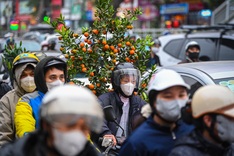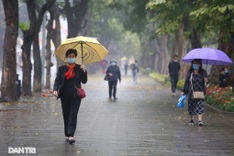Vietnam should immediately look for ways to avoid becoming an industrial garbage dump, a senior official said on Monday.
 |
| Waste is treated by the Hai Phong Urban Environment Co. |
Nguyen Xuan Ly, head of the Ministry of Public Security\'s Environmental Crime Prevention Department, also told a seminar held in Ho Chi Minh City that environmental crimes and violations in the management of hazardous waste had increased nationwide in "complicated" ways.
The main reason was that legal punishments were not strong enough to deter such actions, he said.
The seminar discussed ways to prevent and fight environmental crimes and violations relating to hazardous waste management.
Ly said just 60 percent of hazardous waste generated in the country was treated and the remaining amount was illegally buried, dumped into the environment or recycled for use.
In 2010, Vietnam discharged about 32 million tonnes of solid waste, including 1 million tonnes of hazardous waste.
Hazardous waste is generated mostly in industrial factories, handicraft villages and medical establishments.
While the violations are widespread, inspections and punishment cover only about 10 percent of actual number of cases, according to the Environmental Crime Prevention Department.
Last year, a total of 322 cases of hazardous waste management violations were discovered and fined a total of VND10 billion (USD476,000).
Of these, 29 percent were violations of regulations on discharge of hazardous waste, 33 percent on collecting and transporting it, 25 percent on destroying and dumping it into the environment and 13 percent on recycling it for reuse.
Under current regulations, the highest fine for violations in managing hazardous waste was just VND500 million (USD23,000), while the actions of violating companies fetched them benefits of several billion dong.
Seminar participants said another pressing issue was the widespread violations on importing hazardous waste, including old electronic equipment and old batteries, under the guise of importing raw material for production and temporary import for reexport.
The import of old batteries for taking lead, a process that releases other hazardous substances like acid and mercury into the environment without proper treatment, was having serious environmental impacts, they said.
Ly then commented that Vietnam was becoming an industrial dump for developed countries.
Hoang Van Vy, deputy head of the Ministry of Natural Resources and Environment\'s Inspectorate, said in some localities the capacity of managing hazardous waste was still weak and corruption was prevalent.
To manage hazardous waste effectively, the Government needed to complete detailed legal regulations soon, Vy said.
He said inspections of violations must be strengthened and punishments made to fit the crime.




















